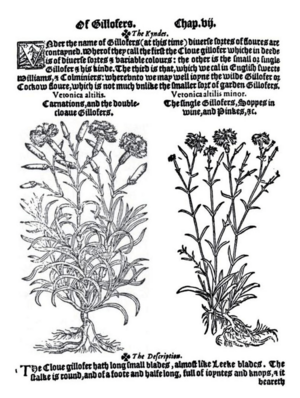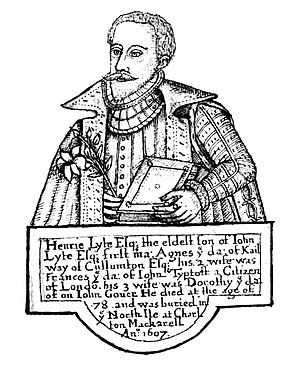Henry Lyte (botanist) facts for kids
Henry Lyte (born around 1529 – died October 16, 1607) was an English botanist and antiquarian. A botanist studies plants, and an antiquarian studies old things like history and ancient objects. He is most famous for two books: A niewe Herball (1578), which was a translation of a plant book by Rembert Dodoens, and The Light of Britayne (1588), a book about British history. Both of these books were dedicated to Queen Elizabeth I.
Henry Lyte's Life
Henry Lyte was born at Lytes Cary Manor in Somerset, England, around 1529. He was the second son of John Lyte. Around 1546, Henry went to Oxford University. We don't know if he finished his degree there. A writer named Anthony à Wood said that Henry studied logic and philosophy. After his studies, he traveled to other countries. When he came back home, he used what he learned to become a very skilled scholar in many subjects.
In 1558, Henry's father, John Lyte, gave his property to Henry. Henry then managed the family estate in Somerset. He continued to do this until his father passed away in 1576. Henry Lyte might have worked as a sheriff in Somerset during the time of Queen Mary I and possibly into the early years of Queen Elizabeth's rule (around 1559).
Henry Lyte was married three times and had several children. His first wife was Agnes, whom he married in 1546. They had five daughters. After Agnes died in 1564, he married Frances in 1565. They had three sons and two daughters. Frances passed away in 1589. In 1591, Henry married Dorothy, and they had two sons and one daughter. Henry Lyte was related to another antiquarian named John Aubrey. Aubrey mentioned that Henry Lyte had "a pretty good collection of plants" for his time. However, a list made by Henry's son only mentions different fruit trees.
Henry Lyte's Work

Henry Lyte's first and most important book was A niewe Herball. A herbal is a book that describes plants, often with their uses in medicine. He translated this book from the Cruydeboeck by Rembert Dodoens, which was originally in Dutch. Lyte translated it into English using a French version of the book. His own copy of the French book, which he used for his translation, is now in the British Museum. On its title page, he wrote: "Henry Lyte taught me to speake English." This book has many notes in Latin and English written in his neat handwriting.
The first edition of A niewe Herball was printed in Antwerp in 1578. It was a large book with 779 pages and 870 pictures of plants. About 30 of these pictures were new and made just for Lyte's book. The book's full title was A niewe Herball or Historie of Plantes. It explained that it was first written in Dutch by D. Remburt Dodoens and then translated into English by Henry Lyte. The book was printed in London by Gerard Dewes. On the back of the title page, it showed Lyte's coat of arms. The book also included a special message to Queen Elizabeth and a portrait of Dodoens. Henry Lyte did not add much new information to the plant descriptions himself. Later editions of the book were printed in London in 1586, 1595, and 1619.
Lyte's second important book was The Light of Britayne. This book was published in 1588. It was also dedicated to Queen Elizabeth and included her portrait. The main goal of this book was to trace the history of the British people all the way back to a legendary figure named Brutus of Troy. Henry Lyte gave a copy of this book to Queen Elizabeth on November 24, 1588. This was when she went to St. Paul's to give thanks for the defeat of the Spanish Armada, a large fleet of ships sent by Spain to invade England.
Henry Lyte's Legacy
Henry Lyte passed away in the same house where he was born, Lytes Cary Manor, on October 16, 1607. He was buried in Charlton Mackrell Church. Today, a copy of his famous book, A niewe Herball, is kept at his family home, Lytes Cary Manor. This historic property is now looked after by the National Trust.
 | John T. Biggers |
 | Thomas Blackshear |
 | Mark Bradford |
 | Beverly Buchanan |


